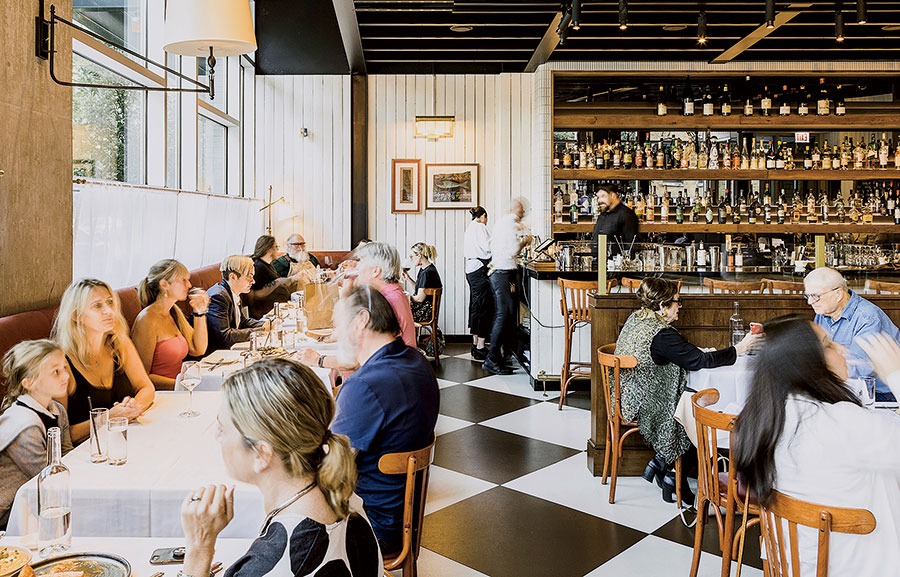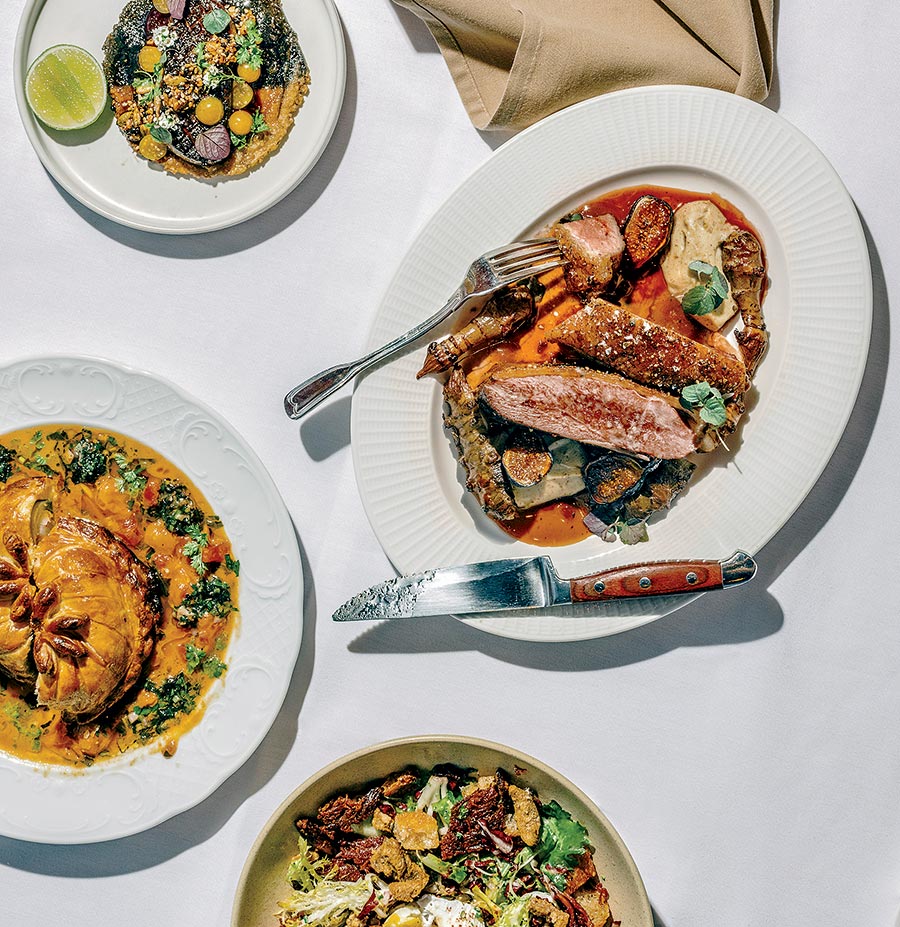As far as restaurant namesakes go, you could do a lot worse than Obélix. True, this French comic hero is simple-minded and combative, but he has a gentle soul, is a true friend to his bestie, Astérix, and cares deeply about his Gallic ancestry and culture.
That last bit also applies to Oliver Poilevey, executive chef and co-owner, with his brother Nicolas of the new River North restaurant that bears the name of the beloved buffoon. The frères Poilevey have put a great deal of thought into what it means to be a French restaurant today — not just the food but the teamwork service, the tile and tablecloths, the clacky energy, and that hard-to-translate benchmark of overall quality that the French would call correcte. The results, in the estimation of this Francophile, are both original and tone perfect.
If the brothers’ surname sounds familiar, you may remember their parents, Jean-Claude and Susanne Poilevey, who for decades delighted guests at Le Bouchon in Bucktown and La Sardine in the West Loop. Both died in recent years, and La Sardine, like many old stalwarts, closed in 2020.
By that point, Oliver had established himself as the chef at Le Bouchon and poured his creative energy into concocting daily specials while leaving the if-it-ain’t-broke-don’t-fix-it menu of sleepy French standards pretty much alone. As a Bucktowner, I can vouch that Le Bouchon performs “neighborhood restaurant” splendidly. It’s roast chicken and a bottle of Côtes du Rhône at a scrunched-in-a-corner bistro table. The food there is good, but at Obélix, which opened in May, it’s much better. Splurgier and more expensive, to be sure, but it fits the neighborhood.
River North? Well, it’s not that River North — not those shouty streets of chain dining. We’re talking the other River North a few blocks away, Chicago’s TriBeCa, where loft dwellers have had few options beyond Gene & Georgetti. Obélix is the restaurant these people have long needed.

They know to check out the daily chalkboard menu for seasonal specials. In late summer, that meant peach desserts, tomatoes galore, and Charentais melons grown for the restaurant by Wisconsin’s Froggy Meadow Farm and turned into a salad with cucumber and goat cheese. That board also proposes a rotating selection of boutique oysters and the wines to drink with them. The oysters come out so cold and clean that I can’t imagine not starting a meal here with a few.
The other nonnegotiable appetizer is the foie gras taco, though it’s divisive. Everyone I’ve talked to who has eaten this dish has voiced a strong yea or nay on it, but I found the seared lobe of foie perfectly cooked, and I loved both the hand-pressed corn tortilla crisped in foie fat and the salsa macha made with fried chiles, nuts, and seeds. I’m not sure it all belonged together but would happily eat another to test my hypothesis.
No controversy surrounds another signature starter: a brilliant beef tartare decked out with lush green garlic aïoli, tangy banh mi pickles, and bits of crisp seasoned kelp. The Asian tilt to the flavors makes you reconsider this old favorite while keeping the essential sharp, pickley seasoning the raw beef needs.
Such is the house style: recherché international ingredients suggest a modern global vibe, but it’s the balanced seasoning and serious technique that make the food timeless. Black cod arrives buttery and crisp skinned, and its bed of green curry velouté and Okinawan sweet potato purée is precisely the rich, nonpushy stuff you want to swipe it through. A soft-shell crab, plump and crackly in a thin sheen of batter, is fresher and meatier than the last 10 soft-shell crabs I’ve eaten, and its Singapore chile glaze is neither too spicy nor too sweet to interfere with fried seafood love.
Best of all is this kitchen’s way with duck — an ingredient it likes so much it devotes a whole section of the menu to quackage in all its many forms. A dry-aged Rohan duck breast sports the kind of crisp, defatted skin that no other restaurant can nail. While the plush, gamy meat stands up to its pungent peanut-turmeric sauce, I wish the cooks had hewed a little closer to canon and trotted out a fruit gastrique. I have nothing but praise, though, for the Lyonnaise salad, made with crispy shreds of pulled duck confit replacing pork belly lardons.
If Poilevey gently modernizes flavors, he also mines the classics to summon forth a more nostalgic notion of French cuisine. In a time when restaurants are getting rid of their bakers, pastry is all over this menu long before dessert. There are savory tarts, beef Wellington, and my favorite: pithiviers de ratatouille, a luscious vegetable pie bound with Humboldt Fog cheese and set atop Sungold tomato sauce and pesto. Come dessert time, a baked Alaska will knock your snowshoes off.
In conversation, Poilevey is eager to give credit to pastry chef Antonio Incandela and chef de cuisine Nathan Kim, who both have the fine-dining training so evident in the kitchen’s execution. But Poilevey himself has the vision, the one his parents taught him: He knows what it all means and how it comes together.
My favorite of three visits was one night when my adult daughter and I scored the last two barstools and passed duck salad and beef tartare back and forth. Among the daily temptations on the chalkboard was a storied wine: a Didier Dagueneau Silex from the Loire Valley, one of the best expressions of Sauvignon Blanc. It was offered by the glass, for $45. “Let’s share one,” I blurted, knowing it would be a lesson (and a treat) for her. The bartender split the pour between two glasses, eyed the ounce remaining in the bottle, and topped her off. We talked about the wine until we didn’t, we swiped pain d’épi through the sauce and picked up big lettuce leaves with our fingers. Everything was right on point. Correcte.




